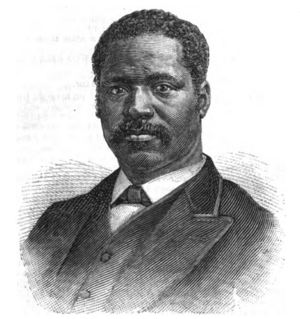Moses A. Hopkins facts for kids
Quick facts for kids
Moses A. Hopkins
|
|
|---|---|

Hopkins in Frank Leslie's Sunday Magazine (1885)
|
|
| United States Minister to Liberia | |
| In office September 11, 1885 – August 7, 1886 |
|
| President | Grover Cleveland |
| Preceded by | John H. Smythe |
| Succeeded by | Charles H. J. Taylor |
| Personal details | |
| Born | December 25, 1846 Montgomery County, Virginia, U.S. |
| Died | August 7, 1886 (aged 39) Liberia |
| Political party | Democratic Party |
| Alma mater | Auburn Theological Seminary |
| Occupation | Clergyman, educator, diplomat |
Moses Aaron Hopkins (December 25, 1846 – August 7, 1886) was an important African-American leader. He was a clergyman, which means a religious leader, and an educator, meaning a teacher. He also served as the United States minister (like an ambassador) to Liberia from 1885 to 1886.
What makes his story even more special is that he was the first person who had been enslaved to become a U.S. ambassador. He died while he was serving his country in Liberia.
Contents
Early Life and Education
Moses Hopkins was born on December 25, 1846, in Montgomery County, Virginia. At the time, he was born into slavery. Around 1850, he was moved to an area near Newbern.
During the American Civil War, he managed to escape. He found safety by working as a cook in camps for the Union Army. After the war, he worked for a short time on steamships. These ships traveled along the Ohio and Mississippi rivers.
A Journey to Learn
Moses Hopkins had an incredible desire to learn. Even though he couldn't read or write just ten years before, he worked hard to get an education. He attended Avery College and then went to Lincoln University. In 1874, he graduated from Lincoln University as the valedictorian. This means he was the top student in his graduating class.
Later, in 1877, he made history again. He became the first black graduate of Auburn Theological Seminary in New York. This was a special school for people studying to become religious leaders. His graduation speech was called "The Problem of Race Reconciliation in the South." It was amazing how far he had come.
Building a Community
After finishing his studies, Moses Hopkins moved to Franklinton, North Carolina on June 14, 1877. There, he worked to build up the community. He started a church and also a school.
Albion Academy
The school he founded was named Albion Academy. It was one of about two dozen schools that helped educate people who had been enslaved. These schools were supported by the Presbyterian Board of Missions for Freedmen.
Moses Hopkins and his wife, Carrie, also started a newspaper. It was called Freedmen’s Friend. The newspaper's main goal was to support Albion Academy and the African-American community.
Serving as a Diplomat
Moses Hopkins was chosen by President Grover Cleveland to be the United States minister to Liberia. This was a very important job, representing the U.S. in another country. He was first appointed on September 11, 1885. Later, the U.S. Senate officially approved his appointment.
He left for Liberia on October 21, 1885. On December 14, 1885, he officially presented his credentials. This is a formal step where a diplomat shows their official papers to the government of the country they are serving in.
A Tragic End
Sadly, Moses Hopkins died on August 7, 1886, while in Liberia. He passed away from a tropical disease, which was then called "African fever." He was not the only U.S. minister to Liberia to die from such illnesses. Between 1882 and 1893, three other U.S. ministers also died there.
At the time of his death, people remembered him as someone who worked very hard. He wanted to help his race and improve conditions in Africa. To support his family, the U.S. Congress gave his widow, Carrie, an allowance of $2,500. This was equal to six months of his salary.
Remembering His Service
On April 30, 2021, Moses Hopkins was honored by the American Foreign Service Association. He was one of 71 "forgotten" people remembered for dying while serving the country in the foreign service. This means he was on duty when he passed away.
 | Aurelia Browder |
 | Nannie Helen Burroughs |
 | Michelle Alexander |

